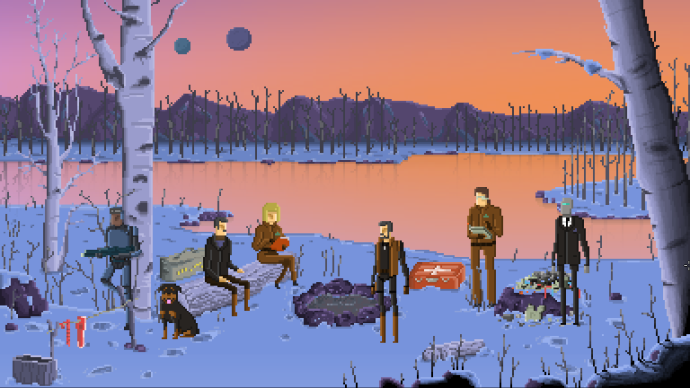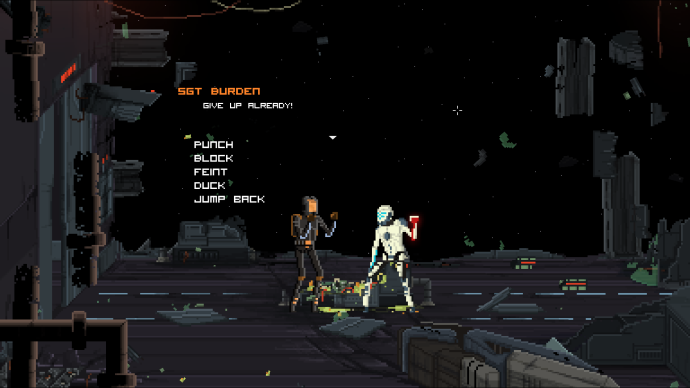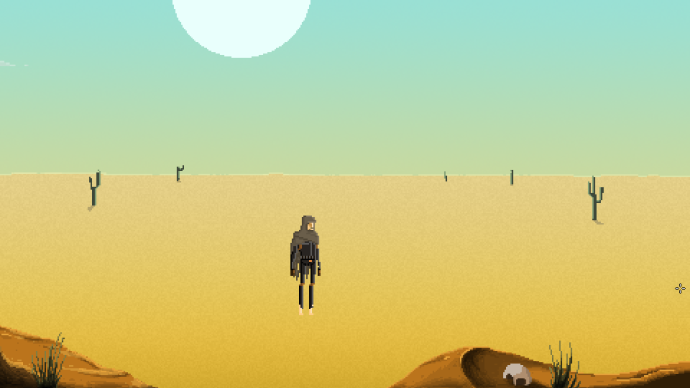Gods Will Be Watching is certainly a videogame. Its challenges are systematic, filled with rote systems to be measured and understood. The game values these challenges highly, despite not necessarily forcing you to feel the same. The characters inexplicably, but endearingly, explain the rules of the systems. Its pixel art isn’t “traditional,” but has an inarguable lineage in the medium of videogames. It has a “morally gray” story to let the player exude agency in interpretation, using ridiculously high stakes involving billions of lives. The soundtrack is best described as an epic score. I say these things without scorn, to make clear how rooted it is in common videogame structures.
Gameplay in Gods Will Be Watching is best represented by its titular chapter. The player is pitted with managing their group’s survival in the wilderness of a cold planet with 5 hours of daylight. They have only 23 days and must fix their radio to send out a signal to a passing convoy. They’ll need to hunt for food, cook their food, gather wood, add the wood to the fire, repair the radio, prepare medicine, and keep their morale up. Only five of these individual actions can be performed per day. With 4 mouths ( including the dog, 5), it’s nearly impossible to keep up. Hunting brings only 2-5 or so rations, with a chance of failure, and still takes more time to cook before eating. Morale will sink like a rock as survival feels so unlikely. If it’s too low for too long, they will run away into the forest: certain death. Talking will help, but talking to everybody takes 4 out of 5 actions out of the day; a giant net loss of food and firewood consumed. Meanwhile, players must also find enough time to repair the radio, which only goes up about 5% per interaction. Predators will attack and sickness will strike to shake up any semblance of stability you may have accumulated.

Dropped in the middle, the only option is to start clicking, and fall head first into failure. Each scenario will surely take several tries to understand the moving parts and several more to master their manipulation. Usually even a few more when random number generation doesn’t cooperate. Every victory is still dire, accruing sacrifices of life or morality. Even now, running through the scenario in my head, I can’t think of a way to beat the system and win without sacrifice. One character ran away after their morale plummeted beyond my control. Then another, grief stricken, ran off as well. I played on one of the easier modes, and this is my best performance yet. With the option to cannibalize, the game implicitly asks you what survival is worth. Is it okay to take one life to secure the rest of the party? Is it okay to even let go of any at all, is a success with two out of four lives even a success? Whether by intent or incompetence, it’s unlikely to beat the game without spilling blood.
Regardless, the player character, Sgt. Burden, prevails. He’s known as the legend: no matter the scenario, he’ll always find a way out. He will always survive. His mission is to infiltrate and stop Xenolifer, a terrorist organization bent on stopping the Constellar Federation, a human intergalactic government that has enslaved alien races. Burden has spent years working undercover to try to get Liam to disband his Xenolifer. After Liam discovers Burden’s betrayal, he resorts to genocide, because the Federation will never negotiate, they will never let go and grant alien rights. Liam plans to unleash the Medusa Virus on Gactus VII, which will take four billion human lives, but not hurt their alien slaves.
A chapter takes place in the desert without warning. The character we know as Sgt. Burden is wandering alone in the desert, with no memory, no name. He happens upon a group of soldiers and leads them back to their military base. On arrival, he assumes the identity of one of the fallen soldiers, taking the name Sgt. Burden. This was the actual start of his journey, seven years ago.
Flying alone to Xenolifer to stop the genocide, Burden has a breakdown. Questioning his purpose. The pointlessness of four billion lives amongst the infinite space. Why he spent his entire life fighting and why he will keep doing it again and again. As long as the gods make him to save the world, he will save the world. He reaches clarity: this reality repeats and loops forever. All these decisions, he’s made them before, but at the same time, he hasn’t made any of them. All in a hope that he could escape the desert. Deaths from each other scenario rapidly flash in his consciousness. They speed and blur together as Burden speeds full throttle and crashes into Xenolifer’s ship.
When Burden confronts Liam, he tells him he’s had this discussion a million times, always hoping he’ll be able to change Liam’s mind. Neither will yield, so again they must battle to save four billion lives, to define their own liberty and justice. Each turn Liam will wind up a move and in response the player can punch, block, dodge, feint, or jump back. A single incorrect choice and Burden dies. The screen displays a loud montage of each scenario up to this point and the battle begins anew. Each death, another seven year journey from the desert. Through trial and error, the player (and Burden) learns how to counter each and every one of Liam’s attacks. The ship, their battlefield, explodes, but they continue fighting, space sprawling behind.

When Burden eventually, and inevitably, wins, he tells Liam that this is the first time he’s beaten him, after a million other tries. Whenever he dies he wakes up in a desert, without remembering anything, and his multitudes of memories only flood back en route to this ship. He angrily questions the design of his fate, this construct of the gods. He hoped that if he at least saved the world once, he would understand everything, but he doesn’t. After deciding to save the four billion lives (or not), Burden jumps off the ship into infinite space, wishing only for rest. He floats past the credits and into a purple wormhole. Burden wakes up in the desert and starts walking.
Gods Will Be Watching skillfully hits all the beats of a traditional videogame. Evocative and challenging, excellent peaks of drama, and justifiable motivations for the protagonists and antagonists. It’s right around now a game like this would normally instill a wave of catharsis as a reward. Yet neither option, killing four billion people, or letting an oppressive, evil government reign freely is gratifying. Even besides that, it all feels pointless. In the end, Burden is indifferent to whether or not Xenolifer commits genocide. If there is a million, if there’s infinite universes where Sgt. Burden fails, or where this doesn’t even happen in the first place, what is the addition of one more? Every brutal struggle, every intense management, every moral dilemma, every person mourned on the way here, it was all meaningless in relative. Existing only to say action is a waste. It would be easier to roll over and die. Look at how much pain you felt, look at how much you ached. For nothing.
I don’t believe nihilism is the only, or the relevant message, from the developers to the world. Given that there is no reason to believe in infinite timelines, the core conceit doesn’t laterally apply to real life. But Gods Will Be Watching does canonize its structure as a videogame, which ironically, is subversive of videogames. Every failed attempt and every bad slice of random number generation isn’t just the player’s failure or bad luck. It’s another one of infinite timelines in the universe, a time where Burden isn’t flawless, a time where fate isn’t on his side. Burden, being a character that fully encompasses a videogame’s success and fail states, is broken. The player doesn’t guide him to accomplishment and success as perhaps normally expected from a videogame. Instead he’s tormented, his very metaphysicality destroyed. As long as us gods are watching, he will be a pained puppet, burdened to entertain us.
Even still, Gods Will Be Watching isn’t a ruthless condemnation. The traditional structure communicates a love for videogames. It isn’t so scornful to direct a confrontation. The game simply points out the inconsistencies. A perfect character is impossible, and when they finally are willed into existence, it’s still null. Gods Will Be Watching questions our right as players. To play in a universe is to destroy it, the integrity is washed away. A normal videogame does not have this problem; it is explicitly artificial, it is not a self-contained universe. When I turn off the game, when I stop watching Gods Will Be Watching, I wonder if Burden finds rest.

Excellent article, it describes the real essence of this gem. The game managed to capture my thoughts for much longer than the end credits, it affected my perception of the concept of fate and the soundtrack always on top of my playlist. Deconstructeam – thank you for creating my favourite game! (And also for Atticus and Supecontinent)
LikeLike